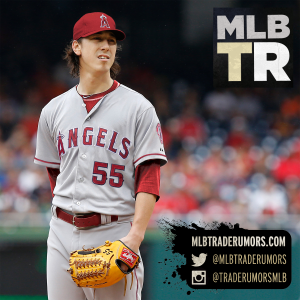The Angels are on pace to exceed the league’s $189MM luxury tax threshold, GM Billy Eppler told reporters including Pedro Moura of the Los Angeles Times (Twitter link). While other in-season moves could well impact the final result, that represents a notable development given the team’s oft-reported operating philosophy.
Los Angeles has long been said to target a level of spending that does not exceed the cap, with that reasoning often cited in explaining the team’s level of interest in seemingly appealing trade and free agent targets. For instance, the hopeful contenders forewent several notable corner outfield options this winter in favor of a budget platoon. Of course, running just past the cap number is quite a bit different than blowing past it with a major acquisition.
But with a whole variety of injuries hitting the club, especially in the pitching department, it was necessary to add reinforcements. The Angels acquired Jhoulys Chacin, taking over his $1.1MM salary, and added Tim Lincecum on a deal that will pay him a pro-rated portion of a $2.5MM annual payout (plus incentives). That last move has apparently pushed the organization past the line, at least if its roster composition holds its current form.
Some have suggested that the Halos could be more comfortable moving above the cap for a single year, and that appears to be the case. Indeed, owner Arte Moreno suggested as much before the 2015 season, and Eppler called it a possibility just this winter. All said, it seems that the club has heavily weighed the luxury tax, but obviously doesn’t view it as a hard cap.
For one thing, Los Angeles will only have to pay a 17.5% tax on any overages as a first-time offender. For another, it may be relatively easy for the team to duck back below the line next year — thus avoiding a bump in the rate — because several high-priced veterans will reach free agency, including C.J. Wilson, Jered Weaver, Joe Smith, and (if his option isn’t exercised) Yunel Escobar.
It remains to be seen whether moving into position to hand over some extra cash will have much of an impact on the team’s plans the rest of the way. The Angels entered play today three games under .500, but they’re still fully in the mix in a crowded AL West. It’s possible to imagine the organization trimming some payroll to dip back under the limbo bar if it falls out of contention, or perhaps being slightly more comfortable in going further over, though it’s hard to see such considerations driving the decisionmaking.
Only six organizations have ever paid luxury tax bill, including the Angels in one prior season (2004). The Dodgers, Yankees, Red Sox, and Tigers appear currently set to do so in 2016. New York, of course, has accounted for the vast majority of the tax dollars over the years. Of course, other organizations could conceivably join them — most notably, the Giants and Cubs. San Francisco edged past the line in 2015 after several mid-season trade acquisitions.
Luxury tax calculations, notably, are not as simple as tabulating annual salaries. Long-term deals are averaged, and there are many nuances that make assessment based on public information a tall task — not least of which is the constantly changing set of players owed salary at the major league level and the ex post calculation of bonuses and options. Plus, there’s a charge (usually estimated at around $11MM) for all teams to account for assorted additional player expenses, such as insurance and pension benefits.
